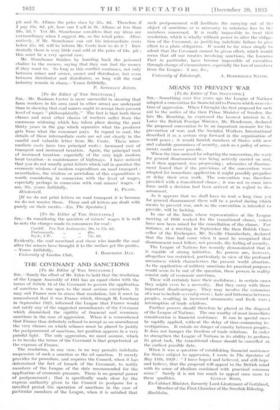THE COVENANT AND SANCTIONS
• [To the Editor of Tim SPECTATOR.] SIR,—Surely the effort of Mr. Eden to hold that the resolution. of the League Assembly of 1921' has an equal claim with the terms of Article 16 of the Covenant to govern the application of sanctions is one open to the most serious exception. It may suit France now to stress that resolution, but it must be • remembered that it was France which, through M. Loucheur in September 1925, informed the League that France would not ratify any of the suggested amendments of the Covenant which diminished the rigidity of financial and economic sanctions in the case of aggression. When it is remembered' that France thus definitely refused to accept as an amendment the very clauses on which reliance must be placed to justify the postponement of sanctions, her position appears in a very painful light. The only aggression, we must assume, which is to invoke the terms of the Covenant is that perpetrated at the expense of France.
The resolution, in any case, in no way permits indefinite suspension of such a sanction as the oil sanction. It merely provides for procedure, and requires the Council, when it has. determined the fact of breach of the Covenant, to notify members of the League of the date recommended for the application of economic pressure. There is no general power of postponement ; that is specifically made clear by the !express authority given to the Council to postpone for a specified period the operation of sanctions in the case of particular members of the League, when it is satisfied that such postponement will facilitate the carrying out of Iii object of sanctions or is necessary to minimise loss to th members concerned. It is really impossible to treat this resolution, which is wholly without power to alter the obliga- tion of the Covenant, as justifying indefinite failure to give effect to a plain obligation. It would be far wiser simply to admit that the Covenant cannot be given effect, which would mean that all our treaties involving sanctions, the Locarno Pact in particular, have become impossible of execution through change of circumstance, especially the loss of members from the League.-1 am, Re.,
University of Edinbargh. A. BERRIEDALE










































 Previous page
Previous page